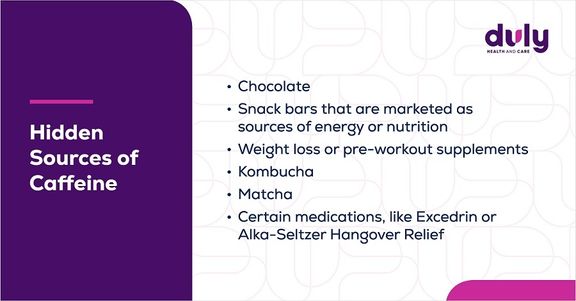From energy drinks to sodas to overpriced coffee concoctions, young adults love their caffeine.
It’s not hard to figure out why. Between busy schedules and not always getting enough sleep, young adults and teenagers often need a boost of energy, and caffeine is a quick and easy way to get it.
But is all that caffeine good for you? What are the effects of caffeine?
If caffeine may as well be one of your food groups, here’s what you need to know.
Too Much Caffeine Can Have Some Unpleasant Side Effects.
Having too much caffeine can take a toll on your body. A lot of caffeine can keep you alert and active – but at a cost.
In the short term, overdoing caffeine can cause side effects such as:
- Faster heart rate
- Faster breathing
- Difficulty falling asleep, staying asleep, or insomnia
- Jitters, restlessness, or shakiness
- Upset stomach
- Anxiety
- Dizziness
- Anxiety
- Depression
These effects might seem like a small price to pay every once in a while. However, constantly having a lot of caffeine can cause more serious health problems. For example, it can put you at risk for addictive behaviors like smoking or alcohol dependency. Unfiltered coffee that is brewed with a French press can increase your cholesterol.
Also read: Why Am I So Tired? Tips & Tricks for Alleviating Fatigue
Caffeine Isn’t Always Bad for You.
That said, there are some benefits to caffeine. One of the well-known ones is its ability to treat headaches. In small doses, caffeine can help you beat a headache. Some people find that it helps them treat migraines, too.
Some other benefits of caffeine (in the right dose) include:
- Decreased appetite, which can slightly reduce weight gain
- Faster reaction time
- Improved liver health
- Increased energy and alertness
- Reduced constipation
There are studies showing that the right amount of caffeine may lower your risk of type 2 diabetes, heart attack, stroke, Parkinson’s disease, and Alzheimer’s disease.
Questions about caffeine intake or improving your energy? Schedule an appointment with a Duly Health and Care primary care provider.
Your Source of Caffeine Makes a Major Difference.
Depending on how you consume it, you may negate the benefits of caffeine and end up putting your health at risk. This is especially true when it comes to the effects of caffeine on your weight.
One of the benefits of caffeine is that it can lower your appetite, which may help you avoid weight gain. But, if you fill your coffee cup with cream and sweeteners, or drink sodas or energy drinks with lots of sugar and calories, you could actually end up gaining weight.
Caffeine Affects Young People Differently Than Adults.
Many of the effects of caffeine are the same regardless of your age. But if you’re a teenager, you may want to be a little more careful.
During your teen years, your body is still growing. If you haven’t reached your full adult size yet, it can take much less caffeine to feel the effects than it does for an adult. You may also be more sensitive to certain effects like anxiety, dehydration, or diarrhea.
There Are Hidden Sources of Caffeine.
Caffeine likes to hide in plain sight. Even if you don’t drink caffeinated beverages, you might still be consuming caffeine.

Also, don’t assume that you’re in the clear if you have a decaf coffee or tea. “Decaf” doesn’t necessarily mean that there’s no caffeine at all. It just means that there is less.
Caffeine Can Affect Medical Conditions.
Caffeine can worsen the symptoms of some medical conditions and make it harder for medications to work. If you have high blood pressure, anxiety, or type 2 diabetes, you may want to limit your caffeine intake.
Also, be aware of interactions between caffeine and certain medications. For example, hormonal birth control pills can increase the time it takes for your body to break down caffeine – and the effects of caffeine could last twice as long as usual. Another example is pseudoephedrine (Sudafed), which is an over-the-counter decongestant. Mixing it with caffeine can increase your blood pressure and/or heart rate.
Alcohol and Caffeine Don’t Mix Well.
In 2010, the US banned the sale of alcoholic drinks containing caffeine. However, the ban hasn’t stopped people from combining alcohol and caffeine. Bars can still sell mixed drinks, like rum and cola or espresso martinis, that are laden with both ingredients. Many people mix their own drinks that have both caffeine and alcohol.
Unfortunately, mixing the two can be dangerous. The combination of alcohol and caffeine has been shown to increase your risk of an alcohol overdose and your likelihood of making risky decisions like getting in a car with a drunk driver. And if you frequently have alcohol and caffeine together, you put yourself at a higher risk for alcohol dependence, alcohol use disorder, and binge drinking.
Also read: Sober-Curious: Benefits of an Alcohol-Free Lifestyle
Find the Right Amount of Caffeine.
When it comes to the right dose of caffeine, there isn’t a magic number. Everyone responds to caffeine differently. Age, medical conditions, lifestyle habits like smoking, or taking certain medications can all impact how caffeine affects you.
But in general, most healthy adults can safely have about 400 milligrams of caffeine per day (roughly four cups of brewed coffee). Adolescents ages 12 to 18 should limit their caffeine to 100 milligrams per day.
Once you’ve hit your limit for the day or feel like it’s too late to have caffeine, there are plenty of other ways to get energized. Taking a short walk, doing a few jumping jacks, eating an apple or banana, or drinking a glass of water can all give you that boost you need without filling your body with caffeine.
Also read: Tips to Avoid Millennial Burnout: How to Stay Healthy and Energized as a Young Adult
The bottom line is you probably don’t need to give up caffeine, but it’s important to pay attention to how much you ingest and your sources of caffeine. If you’re not sure what the right amount is for you, or if you want to find alternatives to caffeine, you can always talk to your healthcare provider.
Health Topics:








